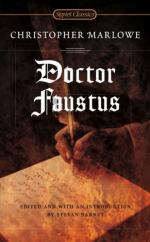|
This section contains 3,647 words (approx. 13 pages at 300 words per page) |

|
SOURCE: "Doctor Faustus: Subversion Through Transgression," in his Radical Tragedy: Religion, Ideology, and Power in the Drama of Shakespeare and His Contemporaries, University of Chicago Press, 1984. Reprinted in Christopher Marlowe's "Doctor Faustus," edited by Harold Bloom, Chelsea House, 1988, pp. 105-14.
In the following excerpt, Dollimore examines Marlowe's "subversion through transgression" of traditional religious values and behaviors in Doctor Faustus.
One problem in particular has exercised critics of Doctor Faustus: its structure, inherited from the morality form, apparently negates what the play experientially affirms—the heroic aspiration of "Renaissance man." Behind this discrepancy some have discerned a tension between, on the one hand, the moral and theological imperatives of a severe Christian orthodoxy and, on the other, an affirmation of Faustus as "the epitome of Renaissance aspiration … all the divine discontent, the unwearied and unsatisfied striving after knowledge that marked the age in which Marlowe wrote" (Doctor Faustus, ed...
|
This section contains 3,647 words (approx. 13 pages at 300 words per page) |

|


